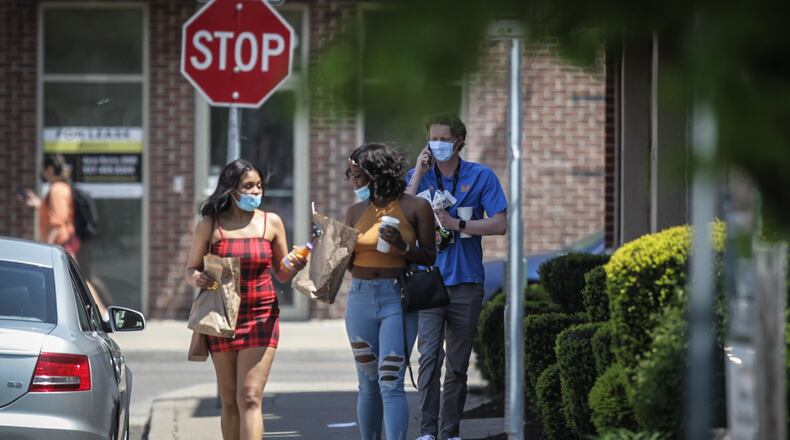The CDC is no longer recommending quarantine periods for unvaccinated individuals who were exposed to COVID-19. The agency updated guidance for unvaccinated individuals to be the same recommendations for vaccinated people who are close contacts of those with COVID-19, which include wearing a face mask for 10 days and getting tested for COVID on the fifth day.
What this means for children in school
For kids who are headed back to class, the CDC also removed its “test to stay” guidance for schools, which previously recommended having students get tested for COVID-19 if they wanted to avoid quarantining at home if they were a close contact exposed to the virus.
Since the CDC said quarantine is no longer recommended for people who are exposed to COVID-19, except in certain high-risk congregate settings, then testing to stay in school is no longer needed. The CDC said if a school or early childhood education program wants to continue with quarantining students who are close contacts, then they can continue utilizing test to stay perimeters.
Colon said schools might a see bump in cases.
“There is going to be a potential for classrooms with localized spread,” Colon said.
If the community spread of COVID is high in that area, the CDC said schools could consider implementing screen testing for students and staff for high-risk activities, such as for close contact sports, band, choir, and other extracurricular groups. According to the CDC, screen testing is used to identify people with COVID-19 who are asymptomatic and do not have known, suspected, or reported exposure to SARS-CoV-2. Screen testing could also be implemented before or after large events, like proms or tournaments, or when when children return from holiday breaks.
What’s not going to change: tracing, isolation, and masks
COVID-19 is still a communicable disease, Suffoletto said, so contact tracing and recommendations of isolation for individuals who have COVID-19 are continuing.
The CDC’s community levels measuring whether the spread of COVID is low, medium, or high in an area will also be continuing.
“The public will be able to refer to the recommendations and determine what to do based on their community level,” Suffoletto said. “COVID is still with us.”
“We’re not abandoning isolation. We’re not abandoning masks,” Colon said.
Face masks are still being required in area hospitals, and masks are also still recommended for use when the COVID community level is high.
Additionally, when individuals test positive for COVID-19, they should still isolate for at least five days and wear a face mask for 10 days. If their COVID symptoms are moderate or severe, they should also isolate for the full 10 days. For individuals with a severe COVID illness and/or who have a weakened immune system, they should consult their doctor before ending their isolation.
Vaccinations remain an important tool
Doctors are also still recommending people get vaccinated against COVID and stay up to date with their vaccinations. Health experts agree that COVID-19 vaccinations continue to be the most effective tool in preventing hospitalizations and severe illness.
Doctors also spoke about the possibility of updated vaccines becoming available later on that will address the new COVID variants and subvariants to help prevent the spread of COVID and not just prevent the severity of the illness.
“We still have the message that we want everyone to get vaccinated,” said Dr. Jeffrey Weinstein, Kettering Health COVID-19 spokesperson and patient safety officer.
Doctors also want individuals with COVID-19 symptoms to get tested, explaining if they test positive for the virus, they should isolate for five days to help prevent the spread of COVID. They can also get access to medication to help alleviate the severity of their symptoms and possibly prevent the need for hospitalization.
“If I am high risk, I can get a medication that can help prevent me from getting hospitalized or dying,” Weinstein said.
Doctors also emphasized the importance of individuals understanding their own health and their own risks.
“We’re moving into a phase where everyone has to understand their own individual risk,” Colon said. He recommended individuals reach out to their health care provider for specific guidance, such as for individuals who may have a weakened or compromised immune system.
“Everybody has got to be attuned to their health,” Colon said.
Where COVID is now
With the easing of quarantining recommendations, health experts say the CDC is recognizing the current state of the pandemic. The spread of the coronavirus continues to fluctuate, but it is becoming a less severe disruption to individuals’ daily lives.
“I think this is kind of a nod to the fact that it’s becoming more endemic,” said Weinstein. “It’s not really going away.” Weinstein said the virus will continue “waxing and waning” to varying degrees of its level of spread.
Doctors said the CDC is also following the research about the virus, making recommendations based on new information.
“The guidelines have evolved with data,” Colon said. “This disease is evolving, and our response is evolving, as well.”
For more information on the CDC’s updated guidance, visit www.cdc.gov.
About the Author

